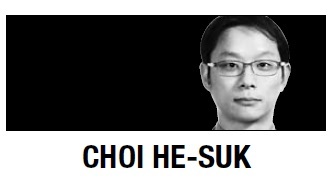[Choi He-suk] Giant snakes, sexy ladies and gruesome murders
By KH디지털2Published : Nov. 18, 2015 - 17:41
Picture a giant snake and a fearsome lion battling -- in a manner as gory as possible -- to the death.

Now, picture a beautiful woman baring all for no apparent reason, or making suggestive remarks to passersby, again for reasons unknown.
Now, someone being the victim of a particularly gruesome murder or carrying out an act of senseless violence.
Imagine, now, otherwise completely ordinary people coming to work to spend the entire day in search of “stories” involving, but not limited to, the items listed above.
All in the name of traffic.
Now imagine another group of ordinary people sitting down in front of their desks clicking on such stories -- and click they do -- with some articles accumulating tens of thousands of views in a single day.
Ten short months ago, I would not have given a moment’s thought to giant snakes, horrible murders, and scantily clad women, at least not at work anyway, much less hoping to “hook” Internet users with them.
A point of interest is that a snake or any kind of predator must be “giant” and murders and other violent crimes must be “grotesque” or “shocking,” and it helps immensely if any woman mentioned in a story is described as young or beautiful. Also, scantily clad men do not have quite the same effect.
These are what are referred to as “fishing articles,” the Korean term for clickbait.
This “fishing” is not limited to clickbait stories. It has long been the norm that headlines need to be “sexy” but that practice seems to have reached a point that many headlines are almost misleading.
While clickbait exists everywhere, the problem in Korea may be amplified by a number of factors.
One such factor is the massive role portal sites play in news outlets’ traffic.
According to rankey.com, websites categorized as news and media receive about 160 million hits per day, and at the top of the list is a news service provided by the country’s largest portal site, Naver.
Naver News is followed by similar services provided by Daum and Nate.
Naver News is not a “producer” of news, it is closer to a news delivery system, a window that provides an easier means to view stories produced by the media in the more traditional sense. Nevertheless, it is included in the news and media category, and clocks in a whopping 50 million hits every day.
The combined daily page-views accumulated by those three news services come in at about 100 million.
In comparison, the websites of Korea’s largest dailies draw a comparatively meager 5 million views.
With hardcopy newspapers’ sell-by date approaching fast, news outlets from “serious” newspapers to those dealing with specialty topics such as entertainment are all using bait in an effort to survive in the sea of Internet traffic.
Even the websites and the small spaces provided by portal sites of the most conservative newspapers contain inordinate amounts of exposed flesh and photos that can only be put online after being partially censored.
When a particular item becomes one of the most searched for terms in one of the portal sites, news outlets pump out one related story after another, some of which only have the most tenuous connection to the subject matter. One particularly absurd example was a recent photo of a celebrity, published online by an outlet that is considered quite serious offline.
A female celebrity had been involved in a minor car accident that day, but the photo story was of the individual in a revealing dress taken months before the incident.
Perhaps, in an age flooded by information, and news organizations, everything has become “news.” Increased competition has not led to the survival of the fittest, but has given the most unfit a chance not only to survive but thrive.
The other possibility, also worrying, is that the definition of being a “good” story has changed, and it is inevitable that readers must fight their way through naked people and giant snakes to find stories with more value in the conventional sense.
By Choi He-suk
Choi He-suk is the digital contents desk editor of The Korea Herald. He can be reached at cheesuk@heraldcorp.com">cheesuk@heraldcorp.com. -- Ed.











![[Today’s K-pop] BTS pop-up event to come to Seoul](http://res.heraldm.com/phpwas/restmb_idxmake.php?idx=644&simg=/content/image/2024/04/17/20240417050734_0.jpg&u=)




![[KH Explains] Hyundai's full hybrid edge to pay off amid slow transition to pure EVs](http://res.heraldm.com/phpwas/restmb_idxmake.php?idx=652&simg=/content/image/2024/04/18/20240418050645_0.jpg&u=20240419100350)

![[Today’s K-pop] Zico drops snippet of collaboration with Jennie](http://res.heraldm.com/phpwas/restmb_idxmake.php?idx=642&simg=/content/image/2024/04/18/20240418050702_0.jpg&u=)